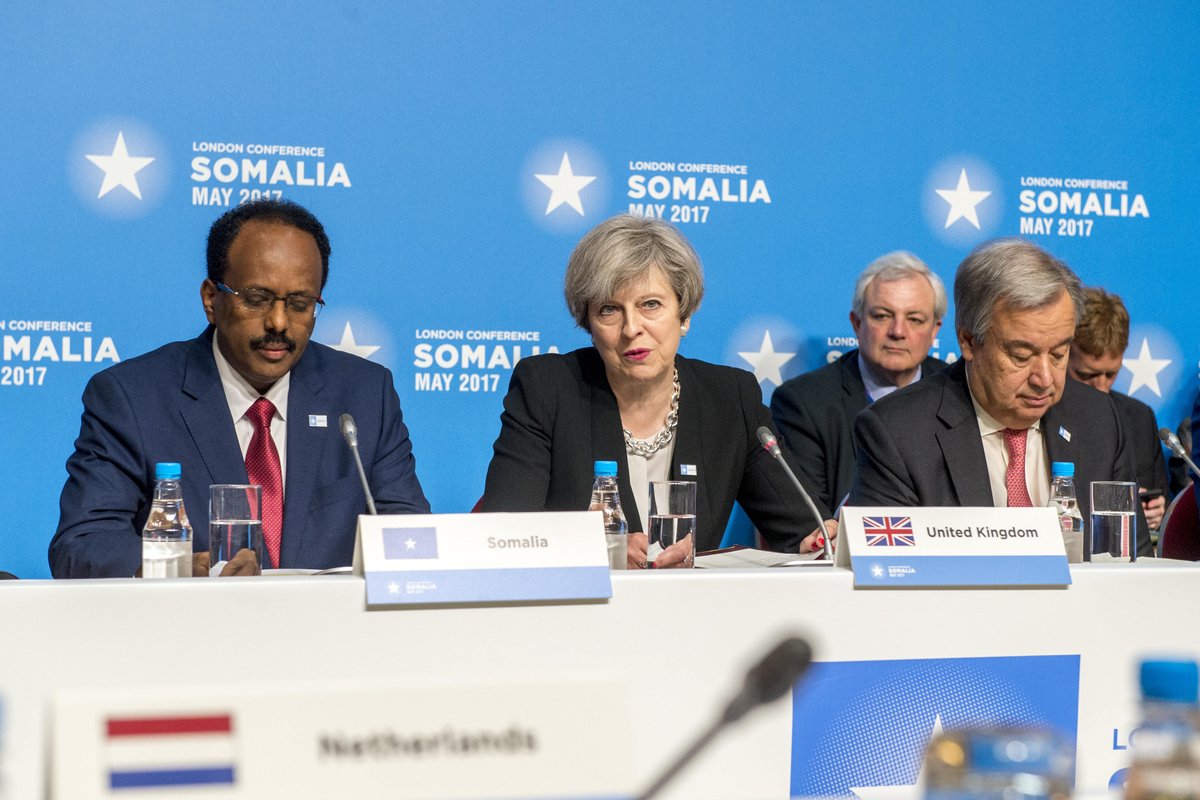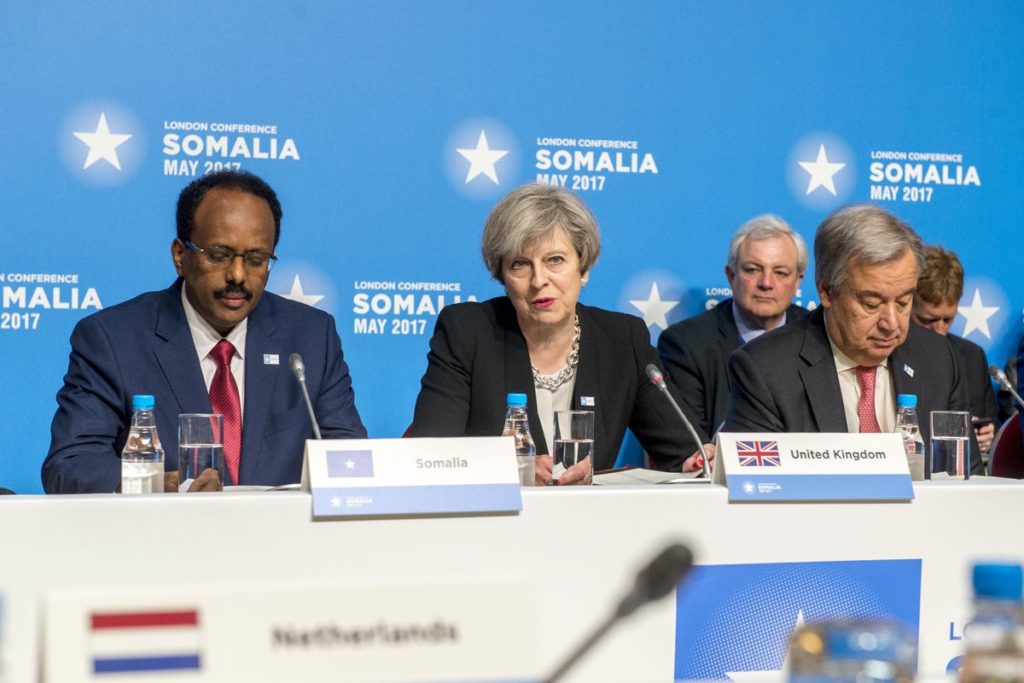Highlights of the Security Pact between Somalia and donors during London Conference


Somalia and donor countries this past week signed a Security Pact following Somalia’s presentation of the newly approved National Security Architecture during the London Conference.
The donors, 42 in total approved the architecture and together with Somalia signed the Pact which sets the framework upon which international donor support for the security reform sector in Somalia shall be based.
Specific donor commitments will be made during a High Level Partnership Conference in October following the expected conclusion of the key milestones set out in the Pact. Notable is the finalization of political agreements between the Federal Government and the Federal Member States including ‘detailed planned to set out sustainable funding from Somali resources and international support.’
The Pact is hinged on five thematic areas, namely Somalia’s political agreements on national security architecture, comprehensive approach to security milestones, international support, conditions-based transition from Amisom to Somali security forces and governance and implementation of the pact.
The Pact sets out a ten year framework but with a focused support of the first four years within the term of the current administration.
National Security Architecture
The National Security Architecture (NSA) is founded on four key areas notably the number of the Somali security forces and civilian oversight and role of the executive over the armed forces. It also focuses on the distribution of the forces along Federal and Member States besides putting into place control and command structures and making clear roles of institutions at Federal and State Level. Finally it outlines the fiscal responsibilities for respective Somali security forces at the federal and state level.
Comprehensive Security Approach
The Security Pact envisions a holistic approach to addressing the security challenges in Somalia. This includes the stabilization of major towns, opening of supply routes, participation in offensive operations and ability of Somali forces to hold recovered areas. Ensuring the security for 2021 elections and impartiality of Somalia’s Security Institutions and forces is also identified as crucial elements.
The Pact also projects a long term commitment by Somalia to build robust security institutions, on a financially sound basis, for securing peace and setting conditions for economic prosperity.
To realise these, the Pact sets out time phased milestones. Between 2017 and 2018, the Pact details political agreements and strengthening links between the Federal Government and member states. Somali security forces must have the capacity to secure the 2021 election which is expected to be on one person one vote basis.
This will involve entrenching the National Security Architecture into legislation to provide the framework for development of key security structures and institutions between 2018 and 2021. During this period, the Pact projects the containment of the militant group Al-Shabaab and phased and condition based draw-down of Amisom.
By 2027 and beyond, Somalia should be able to finance its security budget through domestic revenues, the framers of the Pact note adding the Somalia should have established sustainable and reformed Somali security institutions.
International Support
Donors set a premium on affordability of the security reform process signaling emphasis on Somalia financing its own security in the near term. Support will be informed by Comprehensive Approach to Security (CAS) which provides the conceptual framework for international commitments on principles of affordability, acceptability, accountability and ability, dubbed the 4As.
Specific donor commitments will be based on five strands, namely: enabling effective Amisom operations including conditions-based transition to Somali security forces, accelerating development of Somali National Security Institutions and forces in line with the security architecture and support for Somali government’s stabilization plans and extension of state authority and accountability. The support will also be framed on efforts at countering violent extremism and enhancing coherent international support and establishing of an effective coordination mechanism.
Amisom draw-down and transition to Somali forces
Without making any reference to specific support to Amisom, the international community called for collective responsibility over sustainable funding of Amisom beyond 2018 acknowledging the EU’s funding of the mission since 2007. Kenya’s president Uhuru Kenyatta had during the conference pleaded for a surge of Amisom by 4,000 and supply of force enablers to defeat Al-Shabaab.
To ensure an effective transition from Amisom to Somali security forces, the Pact sets out four key milestones which it identifies as conditions based. The London conference and its outcome is the first step which agreed that Amisom draw-down start from late 2018 and should be based on prevailing conditions. The second step in the technical rollover of Amisom mandate by May 31, 2017.
The partners also identifed the UN-African Union review of Amisom between May and June 2017 as a benchmark of transition. The review will among other recommendations ‘Identify the range of security actors that have a role and make recommendations as to the preferred relationships between them in terms of lead organisation and supporting organisation. It will also make recommendations on Amisom’s future size to enable a conditions based transition to Somali security forces.
The transition will also be informed by Amisom resolutions to be adopted by the UN Security Council in August 2017 which is expected to include recommendations of a joint review.
Governance mechanism
The Pact also contemplates the formation of a governance mechanism to be established in Mogadishu after the London conference. The mechanism will be tasked with effective monitoring of the implementation of the Pact, appropriate allocation of resources, mainstreaming a Somali owned process and developing a working partnership with the New Partnership for Somalia structures.
A technical group, the Comprehensive Approach to Security Executive Group which oversees the CAS is expected to present its first security report in October.
The National Security Office which is established by the Federal Government will work alongside an international security advisory team to ensure coherent delivery of international technical support. The two actors will also develop a unified arrangement bringing together ‘all partners providing support to military police and civilian security activity in Somalia, including relevant UN components and Amisom, to deliver support through a common system which will be agreed by all partners and the Federal Government.’